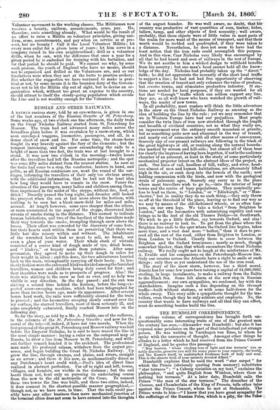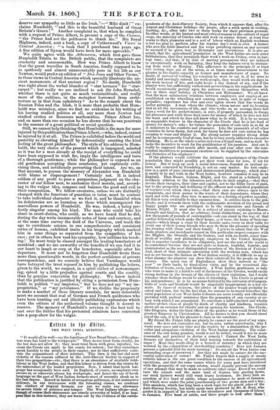THE HUMBOLDT CORRESPONDENCE.
A curious volume of correspondence has brought forth un- questionably some interesting traits of one of the greatest men the century has seen,—Alexander von Humboldt; but also it has exposed some petulance on the part of that intellectual yet strange person. He was writing to Varnhagen von Ease, to whom he spoke with the unreserve of thought. Amongst other things he alludes to a letter which he had received from the Prince Consort of England, and he quotes this passage-
" May heaven, 'whose circling seas of light and star terraces' you so nobly describe, preserve you still for many years to your country, the world, and the Kosmos itself, in undisturbed freshness both of body and soul. This is the sincere wish of your entirely devoted Albert." Humboldt explains that he used the word "star carpet" for which the Prince (obviously quoting from memory) substitutes "star terraces" ; "a Coburg variation on my text," exclaims the philosopher, "and quite English from Windsor, where there is nothing but terraces." At a later date, Humboldt calls the Prince "the man of the star terraces." The describer of the Cosmos, and Chamberlain of the King of Prussia, tells other tales against the Prince Consort, whom he met at Stolzenfels. The Prince wrote to him—" I know that you have great sympathy for the sufferings of the Russian Poles, which is a pity, for the Poles deserve our sympathy as little as the Irish."—" Mihi dixit ! " ex- claims Humboldt, "and this is the beautiful husband of Great Britain's Queen ! " Another complaint is, that when he complied with a request of Prince Albert, to present a copy of the Cosmos, "the Prince had not the politeness to thank me." His Royal Highness, indeed, sent a book, a copy of Catherwood's Views in Central America ; "a book that I purchased two years ago. A fine edition of Byron would have been far more agreeable." We quite agree with the Atheneum, which first gave these Humboldt Tristia to the British public, that the complaints are crochetty and unreasonable. How was Prince Albert to know that the great traveller in South America, fondly supposed to be as spotlessly and almost unaccountably pure in his life as our Newton, would prefer an edition of "lion Juan and Other Poems," to those views in Central America which specially illustrate the an- cient monuments of that ancient region ? No doubt, Humboldt was right about the verbal blunder of "star terraces" for " star- carpet " ; but really we are inclined to ask Sir John Herschel, whether there is not quite as much verisimilitude, and really more of the sublime, in the metaphor borrowed from archi- tecture as in that from upholstery ? As to the remark about the Russian Poles and the Irish, it is more than probable that Hum- boldt was mistaken, since we find no evidences in his writing of his having studied politics at all, any more than Newton had studied erotica or Rousseau mathematics. Prince Albert has, and on more than one occasion he has shown that he can penetrate to the essence of a great political or social question. Still, we cannot help thinking that Humboldt is the man far more injured by thispublicationthan Prince Albert,—who, indeed, cannot be injured by it at all. The Prince is exhibited before the world and posterity as elevating himself by deferentially courting the kind feeling of the great philosopher. The style of his address to Hum- boldt, the very choice of the present which is impugned, selected as it was for a man already at the receipt of everything he could have been supposed to wish for, imply the intelligence and taste of a thorough gentleman ; while the philosopher is exposed as an old gentleman accepting these courtesies, yet captiously criti- cizing them, and invidiously perverting their intent. Are we, on that account, to pursue the memory of Alexander von Humboldt with blame or disparagement? Certainly not. It is indeed seldom of any profit to pass a purposeless judgment on the cha- racter of our fellow men, to anatomize their morals, and, accord- ing to the vulgar idea, compare and balance the good and evil in their composition. We fellow-creatures, unless we are distinctly charged with the functions of guardian or tutor, must be content ' to take individual character as we find it, and be thankful when its deficiencies are as harmless as those which accompanied the marvellous powers of Humboldt. He was, indeed, a being per- fectly singular among his kind. The man who could take his share in court-duties, who could, as we have heard that he did, during the day write innumerable notes of form and courtesy, and at the same time survey the field of the Universe, and teach the age to coordinate science in one comprehensive and consistent series of lessons, exhibited traits in his biography which marked him in some things as separated from the sympathies of his race ; yet in others how vast his sympathy, how sublime his teach- ing! He must truly be classed amongst the leading benefactors of mankind ; and we are unworthy of the benefits if we can find it in our heart to laugh or carp at the benefactor, especially after his departure. It must not be forgotten that Humboldt wrote these more than questionable words, in the perfect confidence of private correspondence, and we scarcely believe that Vaimhagen would have betrayed the trust reposed in him by publishing the letters, given to the world, we suspect, in a spirit rather of newsmonger- ing, spiced by a little prejudice against courts and the courtly, than by genuine veneration for philosophy. We know indeed that the publication is justified by citing a permission from Hum- boldt to publish "my impieties," but he does not say "my im- proprieties," or "my petulances." If we dislike the propensity to make a market of these literary scandals, far more detestable must we account that zeal of German and French quidnuncs who have been hunting out and illicitly publishing expressions which even the editors of the authorized volume thought it decent to reserve. The memory of Humbold's services is the best veil to
• cast over the foibles that his pretended admirers have converted into a peep-show for the vulgar.



























 Previous page
Previous page